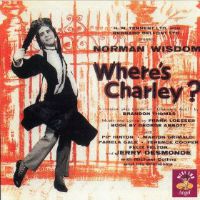 Original London Cast, 1958 (Columbia/Angel)
Original London Cast, 1958 (Columbia/Angel)  (4 / 5) Based on Charley’s Aunt, the reliable old farce by Brandon Thomas, Where’s Charley? was a big hit on Broadway in 1948 with Ray Bolger in the lead. But the show didn’t yield an original cast album, apparently due to a musicians’ strike; nor has there ever been a commercially released soundtrack album drawn from the obscure 1952 film version, in which Bolger recreated his stage role of Charley Wykeham. Fortunately, the 1958 London production yielded a good recording of the delightful score by composer-lyricist Frank Loesser. British stage and film comedian Norman Wisdom may not have had quite the same type of high-wattage comic energy that Bolger possessed, but he was much better suited to the part of Charley in terms of accent and singing ability, and his performance here is ingratiating. The supporting cast is generally fine: Pip Hinton is adorable as Amy Spettigue, while Pamela Gale and Marion Grimaldi sing beautifully as (respectively) Kitty Verdun and Donna Lucia d’Alvadorez. Felix Felton is very funny as Mr. Spettigue, who has no idea that Charley’s aunt — the woman he’s wooing for her money — is actually Charley in drag. The one inadequate performance on the album comes from Terence Cooper, who exhibits an unattractive, throaty singing voice as Jack Chesney. “Once in Love With Amy” is the show’s big hit, but the score is chockablock with skillfully crafted charm songs and comedy numbers (“Better Get Out of Here,” “The Woman in His Room”) and beautiful love ballads (“My Darling, My Darling,” “Lovelier Than Ever,” “At the Red Rose Cotillion”). Disappointingly, only a fragment of the title song is included on this recording; a lengthy ensemble number as written, it’s here reduced to one brief chorus introduced by Wisdom’s quotation of the show’s most famous line of dialogue: “I am Charley’s aunt from Brazil — where the nuts come from!” The album would be essential if only because it’s the sole recording of a fine Loesser score, so it’s good news that the performance is so praiseworthy overall, and that the early stereo sound is excellent. — Michael Portantiere
(4 / 5) Based on Charley’s Aunt, the reliable old farce by Brandon Thomas, Where’s Charley? was a big hit on Broadway in 1948 with Ray Bolger in the lead. But the show didn’t yield an original cast album, apparently due to a musicians’ strike; nor has there ever been a commercially released soundtrack album drawn from the obscure 1952 film version, in which Bolger recreated his stage role of Charley Wykeham. Fortunately, the 1958 London production yielded a good recording of the delightful score by composer-lyricist Frank Loesser. British stage and film comedian Norman Wisdom may not have had quite the same type of high-wattage comic energy that Bolger possessed, but he was much better suited to the part of Charley in terms of accent and singing ability, and his performance here is ingratiating. The supporting cast is generally fine: Pip Hinton is adorable as Amy Spettigue, while Pamela Gale and Marion Grimaldi sing beautifully as (respectively) Kitty Verdun and Donna Lucia d’Alvadorez. Felix Felton is very funny as Mr. Spettigue, who has no idea that Charley’s aunt — the woman he’s wooing for her money — is actually Charley in drag. The one inadequate performance on the album comes from Terence Cooper, who exhibits an unattractive, throaty singing voice as Jack Chesney. “Once in Love With Amy” is the show’s big hit, but the score is chockablock with skillfully crafted charm songs and comedy numbers (“Better Get Out of Here,” “The Woman in His Room”) and beautiful love ballads (“My Darling, My Darling,” “Lovelier Than Ever,” “At the Red Rose Cotillion”). Disappointingly, only a fragment of the title song is included on this recording; a lengthy ensemble number as written, it’s here reduced to one brief chorus introduced by Wisdom’s quotation of the show’s most famous line of dialogue: “I am Charley’s aunt from Brazil — where the nuts come from!” The album would be essential if only because it’s the sole recording of a fine Loesser score, so it’s good news that the performance is so praiseworthy overall, and that the early stereo sound is excellent. — Michael Portantiere
All posts by Michael Portantiere
When Pigs Fly (aka Howard Crabtree’s When Pigs Fly)
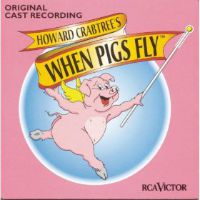 Original Off-Broadway Cast, 1997 (RCA)
Original Off-Broadway Cast, 1997 (RCA)  (2 / 5) The second of two revues that showcased the talents of outré costume designer Howard Crabtree was an evening of bright, largely gay humor. Though several of the songs by composer Dick Gallagher and lyricist-librettist Mark Waldrop are fun, the show’s real strength was visual, matching sketches to outrageously elaborate costume designs. A number called “Light in the Loafers” loses something when you don’t see dancers wearing electrified shoes; so does “Not All Man,” which was delivered onstage by David Pevsner done up as a centaur. A sketch featuring Stanley Bojarski as Carol Ann Knippel, the doyenne of a Midwest community theater, doesn’t slay on the recording the way it did live. Still, there are pleasures to be found here — many of them courtesy of Jay Rogers, who delivers a series of torch songs aimed at the right-wing ideologues Newt Gingrich, Strom Thurmond, and Rush Limbaugh. Rogers also gets the show’s best number: the touching, ruminative “Laughing Matters,” which only gains in poignancy when one knows that Crabtree died of AIDS shortly after this show opened. — David Barbour
(2 / 5) The second of two revues that showcased the talents of outré costume designer Howard Crabtree was an evening of bright, largely gay humor. Though several of the songs by composer Dick Gallagher and lyricist-librettist Mark Waldrop are fun, the show’s real strength was visual, matching sketches to outrageously elaborate costume designs. A number called “Light in the Loafers” loses something when you don’t see dancers wearing electrified shoes; so does “Not All Man,” which was delivered onstage by David Pevsner done up as a centaur. A sketch featuring Stanley Bojarski as Carol Ann Knippel, the doyenne of a Midwest community theater, doesn’t slay on the recording the way it did live. Still, there are pleasures to be found here — many of them courtesy of Jay Rogers, who delivers a series of torch songs aimed at the right-wing ideologues Newt Gingrich, Strom Thurmond, and Rush Limbaugh. Rogers also gets the show’s best number: the touching, ruminative “Laughing Matters,” which only gains in poignancy when one knows that Crabtree died of AIDS shortly after this show opened. — David Barbour
What Makes Sammy Run?
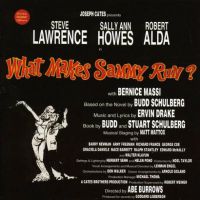 Original Broadway Cast, 1964 (Columbia/GL Music)
Original Broadway Cast, 1964 (Columbia/GL Music)  (1 / 5) Longtime theatergoers will recall that, for a brief time decades ago, Steve Lawrence was touted as the next great Broadway leading man. Exhibit A is this now-forgotten hit (540 performances), adapted by Budd Schulberg and his brother Stuart from the former’s scalding novel about Hollywood climbers. Lawrence is Sammy Glick, who rises from the position of copy boy for a New York newspaper to top Hollywood producer in record time, by any means needed. Sally Ann Howes plays a buttoned-up screenwriter with a yen for hustlers; she’s loved from afar by Robert Alda in the role of a fellow screenwriter and student of Glick. All three are fine, but they’re let down by composer-lyricist Ervin Drake’s score, which strains for ring-a-ding sophistication and doesn’t achieve it. Every number sounds like the opener of a Vegas floor show. Lawrence and Howes do well in “A Room Without Windows,” and Lawrence teams effectively with Bernice Massi, as a studio exec’s predatory daughter, in the appropriately titled “You’re No Good.” Don Walker’s generic orchestrations are no help; neither is the CD edition of the recording, released in mono by Lawrence. It was mediocre shows like this, with their derivative melodies and almost-clever lyrics, that helped bring down the curtain on Broadway’s golden age. — David Barbour
(1 / 5) Longtime theatergoers will recall that, for a brief time decades ago, Steve Lawrence was touted as the next great Broadway leading man. Exhibit A is this now-forgotten hit (540 performances), adapted by Budd Schulberg and his brother Stuart from the former’s scalding novel about Hollywood climbers. Lawrence is Sammy Glick, who rises from the position of copy boy for a New York newspaper to top Hollywood producer in record time, by any means needed. Sally Ann Howes plays a buttoned-up screenwriter with a yen for hustlers; she’s loved from afar by Robert Alda in the role of a fellow screenwriter and student of Glick. All three are fine, but they’re let down by composer-lyricist Ervin Drake’s score, which strains for ring-a-ding sophistication and doesn’t achieve it. Every number sounds like the opener of a Vegas floor show. Lawrence and Howes do well in “A Room Without Windows,” and Lawrence teams effectively with Bernice Massi, as a studio exec’s predatory daughter, in the appropriately titled “You’re No Good.” Don Walker’s generic orchestrations are no help; neither is the CD edition of the recording, released in mono by Lawrence. It was mediocre shows like this, with their derivative melodies and almost-clever lyrics, that helped bring down the curtain on Broadway’s golden age. — David Barbour
What About Luv?
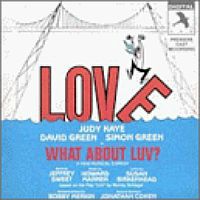 Studio Cast, 1990 (JAY) No stars; not recommended. The only reason to musicalize a play is to add something to it, to enrich the original material. But again and again in this show based on Murray Schisgal’s unique, distinctive, and uproarious 1964 comedy Luv, moments from the play are flattened out by what can only be called by-the-numbers musical theater writing. For instance, one famous scene in the play has two men comparing their miserable childhoods, each trying to prove that he had a tougher upbringing; simply putting the scene into song form robs it of most of its surprise, and about half of the original material is missing entirely. In another scene in Luv, the wife of one of the men comes on with a graph illustrating their lack of a sex life, and the no-nonsense tone of her speech is immensely funny; but composer Howard Marren and lyricist Susan Birkenhead have set the sequence as a jazz waltz, which is not only emotionally inappropriate but also makes it very difficult to understand the words. The plot point is covered, but it’s not the least bit funny anymore. Throughout, the thoroughly conventional songs sentimentalize the characters in a complete betrayal of the loopy original material. The cast of this recording includes Judy Kaye (who starred in the original Off-Broadway production) along with her husband David Green and the unrelated Simon Green. — David Wolf
Studio Cast, 1990 (JAY) No stars; not recommended. The only reason to musicalize a play is to add something to it, to enrich the original material. But again and again in this show based on Murray Schisgal’s unique, distinctive, and uproarious 1964 comedy Luv, moments from the play are flattened out by what can only be called by-the-numbers musical theater writing. For instance, one famous scene in the play has two men comparing their miserable childhoods, each trying to prove that he had a tougher upbringing; simply putting the scene into song form robs it of most of its surprise, and about half of the original material is missing entirely. In another scene in Luv, the wife of one of the men comes on with a graph illustrating their lack of a sex life, and the no-nonsense tone of her speech is immensely funny; but composer Howard Marren and lyricist Susan Birkenhead have set the sequence as a jazz waltz, which is not only emotionally inappropriate but also makes it very difficult to understand the words. The plot point is covered, but it’s not the least bit funny anymore. Throughout, the thoroughly conventional songs sentimentalize the characters in a complete betrayal of the loopy original material. The cast of this recording includes Judy Kaye (who starred in the original Off-Broadway production) along with her husband David Green and the unrelated Simon Green. — David Wolf
Simply Heavenly
 Original Broadway Cast, 1958 (Columbia/Masterworks Broadway)
Original Broadway Cast, 1958 (Columbia/Masterworks Broadway)  (3 / 5) Strong reviews kept Simply Heavenly on the boards for about four months in all. The show opened Off-Broadway, later moved to Broadway for a while, then went back to Off-Broadway in a different venue and finished its run there. Sometime in the middle of all that, this album was recorded. The show was also telecast by WNET-Channel 13 for five consecutive evenings in 1959 as part of the station’s “Play of the Week” series. Langston Hughes fashioned the book and lyrics from “Simple Takes a Wife” and other stories he wrote about the life of the character Jess Simple in Harlem of the 1950s. The evocative music is by David Martin, and the jazzy arrangements make good use of electric guitars and throbbing trumpets. Melvin Stewart, who plays Simple, is not the greatest singer, but he’s effective in his three monologues included on the recording. Vocal honors go to Claudia McNeil, who sashays through her 11-o’clock number, “I’m a Good Old Girl,” with humor and style. Partnered by John Bouie, McNeil also rips into “Did You Ever Hear the Blues?” and “When I’m in a Quiet Mood.” Other pleasures include the sweet title song, sung by Marilyn Berry; “Let Me Take You for a Ride,” an amusing duet for Simple and Anna English; and Brownie McGhee’s artful interpretation of “Broken Strings.” — Jeffrey Dunn
(3 / 5) Strong reviews kept Simply Heavenly on the boards for about four months in all. The show opened Off-Broadway, later moved to Broadway for a while, then went back to Off-Broadway in a different venue and finished its run there. Sometime in the middle of all that, this album was recorded. The show was also telecast by WNET-Channel 13 for five consecutive evenings in 1959 as part of the station’s “Play of the Week” series. Langston Hughes fashioned the book and lyrics from “Simple Takes a Wife” and other stories he wrote about the life of the character Jess Simple in Harlem of the 1950s. The evocative music is by David Martin, and the jazzy arrangements make good use of electric guitars and throbbing trumpets. Melvin Stewart, who plays Simple, is not the greatest singer, but he’s effective in his three monologues included on the recording. Vocal honors go to Claudia McNeil, who sashays through her 11-o’clock number, “I’m a Good Old Girl,” with humor and style. Partnered by John Bouie, McNeil also rips into “Did You Ever Hear the Blues?” and “When I’m in a Quiet Mood.” Other pleasures include the sweet title song, sung by Marilyn Berry; “Let Me Take You for a Ride,” an amusing duet for Simple and Anna English; and Brownie McGhee’s artful interpretation of “Broken Strings.” — Jeffrey Dunn
West Side Story
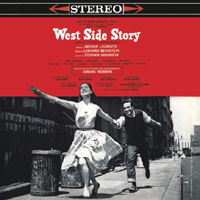 Original Broadway Cast, 1957 (Columbia/Sony/Masterworks Broadway)
Original Broadway Cast, 1957 (Columbia/Sony/Masterworks Broadway)  (5 / 5) Conceived by Jerome Robbins, with music by Leonard Bernstein, lyrics by Stephen Sondheim (and an uncredited Bernstein), and a book by Arthur Laurents, West Side Story is a groundbreaking musical theater work that remains thrillingly vital and is continually revived worldwide, both professionally and by schools and community theaters. The phenomenal score, including such by now universally beloved songs as “Tonight,” “Maria,” and “Somewhere,” deepens the audience’s emotional involvement in an immortal story of star-crossed lovers, inspired by Shakespeare’s Romeo and Juliet and reset among warring American and Puerto Rican gangs in Manhattan circa 1957. Happily, the score is well represented by this recording, which has a theatrical snap and an emotional conviction that more than compensate for any flaws in the performance. Although Carol Lawrence’s soprano thins out in the highest reaches of Maria’s music, and Larry Kert’s tenor develops something of a braying quality when he pushes for volume, both singers sound lovely in the more lyrical sections of the score, and they bring a youthful, unaffected style to their roles. Chita Rivera is a ball of fire as Anita, and Mickey Calin (later Michael Callan) sounds equally sexy as Riff. Reri Grist sings a lovely “Somewhere,” and Marilyn Cooper makes a notable contribution to the “America” number. Nearly an hour’s worth of material was laid down in the studio, making this one of the longest Broadway cast albums of its day, the better to document the superb score as performed by the original company; among the few significant sections missing are the “Blues” and “Promenade” sections of the Dance at the Gym. The bravura playing of the orchestra, conducted by Max Goberman, is captured in excellent early stereo sound. — Michael Portantiere
(5 / 5) Conceived by Jerome Robbins, with music by Leonard Bernstein, lyrics by Stephen Sondheim (and an uncredited Bernstein), and a book by Arthur Laurents, West Side Story is a groundbreaking musical theater work that remains thrillingly vital and is continually revived worldwide, both professionally and by schools and community theaters. The phenomenal score, including such by now universally beloved songs as “Tonight,” “Maria,” and “Somewhere,” deepens the audience’s emotional involvement in an immortal story of star-crossed lovers, inspired by Shakespeare’s Romeo and Juliet and reset among warring American and Puerto Rican gangs in Manhattan circa 1957. Happily, the score is well represented by this recording, which has a theatrical snap and an emotional conviction that more than compensate for any flaws in the performance. Although Carol Lawrence’s soprano thins out in the highest reaches of Maria’s music, and Larry Kert’s tenor develops something of a braying quality when he pushes for volume, both singers sound lovely in the more lyrical sections of the score, and they bring a youthful, unaffected style to their roles. Chita Rivera is a ball of fire as Anita, and Mickey Calin (later Michael Callan) sounds equally sexy as Riff. Reri Grist sings a lovely “Somewhere,” and Marilyn Cooper makes a notable contribution to the “America” number. Nearly an hour’s worth of material was laid down in the studio, making this one of the longest Broadway cast albums of its day, the better to document the superb score as performed by the original company; among the few significant sections missing are the “Blues” and “Promenade” sections of the Dance at the Gym. The bravura playing of the orchestra, conducted by Max Goberman, is captured in excellent early stereo sound. — Michael Portantiere
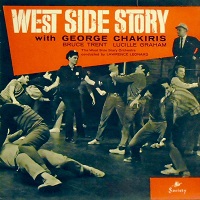 London/British Tour and Studio Casts, 1959-1966 (Various Labels)
London/British Tour and Studio Casts, 1959-1966 (Various Labels)  (3 / 5) A note from Christopher Hamilton: “The Original London Cast Recording of West Side Story was only an EP with four songs — ‘Maria,’ ‘Tonight,’ ‘I Feel Pretty’ and ‘One Hand, One Heart’ — sung by Don McKay and Marlys Watters. It was released in 1959. In 1961, a studio cast recording was released, conducted by Lawrence Leonard, who was the MD [musical director] on the original London production. The album featured George Chakiris (Riff) singing ‘Cool.’ In 1966, another studio cast recording was released featuring David Holliday (Tony), Jill Martin (Maria), Mary Preston (Anita), and Tony Adams (Riff). These performers had all played the roles in the West End or on tour. This recording was conducted by Alyn Ainsworth.” As heard in a historically valuable compilation presented on YouTube by Hamilton, the overall quality level of these rare recordings is quite high. Particularly enjoyable tracks include Holliday’s “Something’s Coming” and Chakiris’s “Cool.” (Chakiris won acclaim and an Academy Award for his performance as Bernardo in the film of West Side Story, so it’s a lot of fun to hear him sing one of Riff’s songs.) Watters and McKay do a beautiful job with the “Tonight” duet and “One Hand, One Heart”; her high soprano notes are fuller than Carol Lawrence’s, and some listeners will find his vocal tone more pleasing than Larry Kert’s. On the minus side, McKay’s “Maria” is marred by a too-slow tempo and his flattening of some of the rhythms. It’s interesting to note that, as was the case with the OBCR, the tempi for many of these recordings — especially the dance numbers — are very fast, no doubt to help fit more material onto the vinyl LPs of the day. [Note: The image included with this review is of the LP cover of the 1961 recording.] — M.P.
(3 / 5) A note from Christopher Hamilton: “The Original London Cast Recording of West Side Story was only an EP with four songs — ‘Maria,’ ‘Tonight,’ ‘I Feel Pretty’ and ‘One Hand, One Heart’ — sung by Don McKay and Marlys Watters. It was released in 1959. In 1961, a studio cast recording was released, conducted by Lawrence Leonard, who was the MD [musical director] on the original London production. The album featured George Chakiris (Riff) singing ‘Cool.’ In 1966, another studio cast recording was released featuring David Holliday (Tony), Jill Martin (Maria), Mary Preston (Anita), and Tony Adams (Riff). These performers had all played the roles in the West End or on tour. This recording was conducted by Alyn Ainsworth.” As heard in a historically valuable compilation presented on YouTube by Hamilton, the overall quality level of these rare recordings is quite high. Particularly enjoyable tracks include Holliday’s “Something’s Coming” and Chakiris’s “Cool.” (Chakiris won acclaim and an Academy Award for his performance as Bernardo in the film of West Side Story, so it’s a lot of fun to hear him sing one of Riff’s songs.) Watters and McKay do a beautiful job with the “Tonight” duet and “One Hand, One Heart”; her high soprano notes are fuller than Carol Lawrence’s, and some listeners will find his vocal tone more pleasing than Larry Kert’s. On the minus side, McKay’s “Maria” is marred by a too-slow tempo and his flattening of some of the rhythms. It’s interesting to note that, as was the case with the OBCR, the tempi for many of these recordings — especially the dance numbers — are very fast, no doubt to help fit more material onto the vinyl LPs of the day. [Note: The image included with this review is of the LP cover of the 1961 recording.] — M.P.
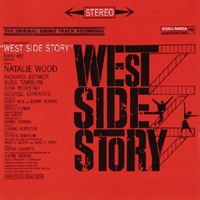 Film Soundtrack, 1961 (Columbia/Sony)
Film Soundtrack, 1961 (Columbia/Sony)  (5 / 5) The ubiquitous movie vocal double Marni Nixon here sings Maria’s music in lieu of the film’s star, Natalie Wood, and her performance points up one of the challenges in casting West Side Story: If you find performers who can fulfill the musical requirements of this difficult score, they probably won’t be entirely convincing as New York City street kids. Nixon’s opera-quality lyric soprano is not exactly that of a teenage Nuyorican girl, but her voice is very beautiful in itself, and the matching of her singing to Wood’s speech is skillfully done in the movie. Jim Bryant, dubbing for Richard Beymer, has a less “legit” sound, but he does an overall admirable job with Tony’s vocals, despite the fact that he often seems to be singing below his ideal range because the original keys of many of the songs were dropped for the film medium. Sharing Anita’s musical moments, Rita Moreno and dubber Betty Wand both do very well, and there is no disconnect between their voices. An intriguing fact of the recording is that, while Russ Tamblyn sings for himself in “Gee, Officer Krupke,” he’s dubbed by fellow cast member Tucker Smith for the “Jet Song.” Since Smith does his own singing in “Cool,” that means he’s actually heard on the soundtrack as two different characters. To make things even more interesting, Nixon sings Anita’s part in the latter part of the “Quintet,” presumably because it was too high for Wand or Moreno. Happily, the movie and this recording feature what are more or less the original theater orchestrations by Bernstein, Sid Ramin, and Irwin Kostal, beefed-up for a much larger orchestra conducted by Johnny Green. The “expanded” edition of the soundtrack album includes dialogue and music taken directly from the film. Though it’s great to have this extra material, including a thrilling orchestral performance of the “Mambo,” the sound quality of the added sections is noticeably different from that of the tracks taken from the original soundtrack album master, and the switching from one to the other is a bit disconcerting. — M.P.
(5 / 5) The ubiquitous movie vocal double Marni Nixon here sings Maria’s music in lieu of the film’s star, Natalie Wood, and her performance points up one of the challenges in casting West Side Story: If you find performers who can fulfill the musical requirements of this difficult score, they probably won’t be entirely convincing as New York City street kids. Nixon’s opera-quality lyric soprano is not exactly that of a teenage Nuyorican girl, but her voice is very beautiful in itself, and the matching of her singing to Wood’s speech is skillfully done in the movie. Jim Bryant, dubbing for Richard Beymer, has a less “legit” sound, but he does an overall admirable job with Tony’s vocals, despite the fact that he often seems to be singing below his ideal range because the original keys of many of the songs were dropped for the film medium. Sharing Anita’s musical moments, Rita Moreno and dubber Betty Wand both do very well, and there is no disconnect between their voices. An intriguing fact of the recording is that, while Russ Tamblyn sings for himself in “Gee, Officer Krupke,” he’s dubbed by fellow cast member Tucker Smith for the “Jet Song.” Since Smith does his own singing in “Cool,” that means he’s actually heard on the soundtrack as two different characters. To make things even more interesting, Nixon sings Anita’s part in the latter part of the “Quintet,” presumably because it was too high for Wand or Moreno. Happily, the movie and this recording feature what are more or less the original theater orchestrations by Bernstein, Sid Ramin, and Irwin Kostal, beefed-up for a much larger orchestra conducted by Johnny Green. The “expanded” edition of the soundtrack album includes dialogue and music taken directly from the film. Though it’s great to have this extra material, including a thrilling orchestral performance of the “Mambo,” the sound quality of the added sections is noticeably different from that of the tracks taken from the original soundtrack album master, and the switching from one to the other is a bit disconcerting. — M.P.
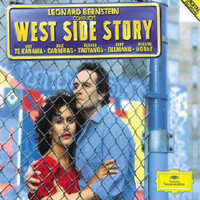 Studio Cast, 1985 (Deutsche Grammophon) No stars; not recommended. A near-total disaster, preserved for posterity in the form of this album and also in a gasp-inducing film documentary of the studio sessions. It was a great idea (in theory) to have Leonard Bernstein conduct a full recording of the West Side Story score, but a horrendous idea to cast all of the major roles with opera singers. While José Carreras’s tenor sounds gorgeous here, his thick Latino accent makes him ridiculous in the role of Tony from a dramatic standpoint. This wouldn’t be a problem in terms of enjoying the performance on a purely musical level, but Carreras also seems extremely uncomfortable with the more “pop” elements of the score — for example, the syncopations in “Something’s Coming.” Although the late, great operatic mezzo Tatiana Troyanos was duly praised for her performances in works by Bizet, Mozart, et al., she is an overripe Anita, while the talented baritone Kurt OIlman creates a sound more appropriate for Don Giovanni than for Riff. Kiri Te Kanawa as Maria fares best among the principals, but still, she sounds too mature and self-possessed to be credible as a very young, innocent, Puerto Rican girl. Even Bernstein’s conducting is a disappointment; there are wonderful moments, but also some extremely odd tempi. For example, both “One Hand, One Heart” and “I Feel Pretty” are way too slow by any reasonable measure. The one major plus of the project is star mezzo soprano Marilyn Horne’s gorgeous and moving rendition of”Somewhere.” — M.P.
Studio Cast, 1985 (Deutsche Grammophon) No stars; not recommended. A near-total disaster, preserved for posterity in the form of this album and also in a gasp-inducing film documentary of the studio sessions. It was a great idea (in theory) to have Leonard Bernstein conduct a full recording of the West Side Story score, but a horrendous idea to cast all of the major roles with opera singers. While José Carreras’s tenor sounds gorgeous here, his thick Latino accent makes him ridiculous in the role of Tony from a dramatic standpoint. This wouldn’t be a problem in terms of enjoying the performance on a purely musical level, but Carreras also seems extremely uncomfortable with the more “pop” elements of the score — for example, the syncopations in “Something’s Coming.” Although the late, great operatic mezzo Tatiana Troyanos was duly praised for her performances in works by Bizet, Mozart, et al., she is an overripe Anita, while the talented baritone Kurt OIlman creates a sound more appropriate for Don Giovanni than for Riff. Kiri Te Kanawa as Maria fares best among the principals, but still, she sounds too mature and self-possessed to be credible as a very young, innocent, Puerto Rican girl. Even Bernstein’s conducting is a disappointment; there are wonderful moments, but also some extremely odd tempi. For example, both “One Hand, One Heart” and “I Feel Pretty” are way too slow by any reasonable measure. The one major plus of the project is star mezzo soprano Marilyn Horne’s gorgeous and moving rendition of”Somewhere.” — M.P.
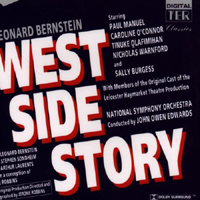 London/Studio Cast, 1993 (JAY, 2CDs)
London/Studio Cast, 1993 (JAY, 2CDs)  (2 / 5) According to a note in the accompanying booklet, “This recording is inspired by the Leicester Haymarket Theatre production which opened on November 20, 1992.” It’s a complete recording of the score with many nice features but a few flaws so major that they damage the overall experience. The tempi set by conductor John Owen Edwards are much closer to ideal than those often found in a British performance of an American musical; one exception is “I Feel Pretty,” which is far too slow, Edwards here following the bad example set by composer Leonard Bernstein himself on the Deutsche Grammophon recording reviewed above. The brilliant West Side Story score, in its original orchestrations by Bernstein, Sid Ramin, and Irwin Kostal, is for the most part magnificently played by the National Symphony Orchestra under Edwards’ leadership. Also, the sound quality of the recording is superb, its dynamic range allowing for many exciting musical moments. As for the singers, Tinuke Olafimihan is a lovely Maria, and Caroline O’Connor is very good as Anita despite her tendency to growl a little too often. Another plus is Sally Burgess’s beautiful rendition of “Somewhere.” But Paul Manuel’s voice is so thin that it’s hard to understand how he could ever have been cast as Tony. A further problem is Manuel’s inability to disguise his English accent; the same can be said for all of the “Jets” on this recording, and it sure is disorienting to hear New York street toughs sounding as if they were born and bred in Great Britain, as compared to the far more skillful accent work heard on the previous British recordings reviewed above. — M.P.
(2 / 5) According to a note in the accompanying booklet, “This recording is inspired by the Leicester Haymarket Theatre production which opened on November 20, 1992.” It’s a complete recording of the score with many nice features but a few flaws so major that they damage the overall experience. The tempi set by conductor John Owen Edwards are much closer to ideal than those often found in a British performance of an American musical; one exception is “I Feel Pretty,” which is far too slow, Edwards here following the bad example set by composer Leonard Bernstein himself on the Deutsche Grammophon recording reviewed above. The brilliant West Side Story score, in its original orchestrations by Bernstein, Sid Ramin, and Irwin Kostal, is for the most part magnificently played by the National Symphony Orchestra under Edwards’ leadership. Also, the sound quality of the recording is superb, its dynamic range allowing for many exciting musical moments. As for the singers, Tinuke Olafimihan is a lovely Maria, and Caroline O’Connor is very good as Anita despite her tendency to growl a little too often. Another plus is Sally Burgess’s beautiful rendition of “Somewhere.” But Paul Manuel’s voice is so thin that it’s hard to understand how he could ever have been cast as Tony. A further problem is Manuel’s inability to disguise his English accent; the same can be said for all of the “Jets” on this recording, and it sure is disorienting to hear New York street toughs sounding as if they were born and bred in Great Britain, as compared to the far more skillful accent work heard on the previous British recordings reviewed above. — M.P.
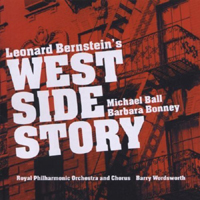 Studio Cast, 1993 (Pickwick/Warner Classics) No stars; not recommended. This recording features West End musical star Michael Ball and the acclaimed American operatic soprano Barbara Bonney as Tony and Maria, with LaVerne Williams as Anita and Christopher Howard as Riff. (In a major oversight, the “Somewhere” soloist is not identified. It sounds like it could be Bonney, but who knows?) The principals are backed by the Royal Philharmonic Orchestra and Chorus, conducted by Barry Wordsworth. But if any of that sounds good to you, please think twice. While Ball possesses a strong and attractive vocal instrument, his singing is severely marred by weird inflections, exaggerations, and enunciations. For example, when he sings “Tonight there will be no morning star,” the last word sounds like “staa-huh-EHHHH.” The tastelessness of Ball’s singing is exacerbated by his failed attempt to sound like a New York teenager; instead, he comes across as a Brit affecting the mannerisms of a Las Vegas lounge singer. The performance of Williams, a mezzo with a cavernous register break, is equally problematic, her Anita almost seeming to have been created for a comedy sketch about opera singers ruining great musicals. Howard and the other Jets are less objectionable, though their attempts to hide their British accents are more amusing than successful. Bonney, with her sweet but strong vocal tone, is the best of the leads by far. As for the orchestral cuts on this album, the prologue is lethargic, and each section of the “Dance at the Gym” sequence is either a little too fast or a little too slow. — M.P.
Studio Cast, 1993 (Pickwick/Warner Classics) No stars; not recommended. This recording features West End musical star Michael Ball and the acclaimed American operatic soprano Barbara Bonney as Tony and Maria, with LaVerne Williams as Anita and Christopher Howard as Riff. (In a major oversight, the “Somewhere” soloist is not identified. It sounds like it could be Bonney, but who knows?) The principals are backed by the Royal Philharmonic Orchestra and Chorus, conducted by Barry Wordsworth. But if any of that sounds good to you, please think twice. While Ball possesses a strong and attractive vocal instrument, his singing is severely marred by weird inflections, exaggerations, and enunciations. For example, when he sings “Tonight there will be no morning star,” the last word sounds like “staa-huh-EHHHH.” The tastelessness of Ball’s singing is exacerbated by his failed attempt to sound like a New York teenager; instead, he comes across as a Brit affecting the mannerisms of a Las Vegas lounge singer. The performance of Williams, a mezzo with a cavernous register break, is equally problematic, her Anita almost seeming to have been created for a comedy sketch about opera singers ruining great musicals. Howard and the other Jets are less objectionable, though their attempts to hide their British accents are more amusing than successful. Bonney, with her sweet but strong vocal tone, is the best of the leads by far. As for the orchestral cuts on this album, the prologue is lethargic, and each section of the “Dance at the Gym” sequence is either a little too fast or a little too slow. — M.P.
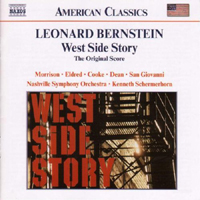 Studio Cast, 2001 (Naxos)
Studio Cast, 2001 (Naxos)  (2 / 5) This is billed as a recording of “the original score” of West Side Story, whatever that means. All sections of the “Dance at the Gym” are included — except for the lovely “cha-cha” setting of “Maria” that accompanies Tony and Maria’s love-at-first-sight scene. The version of “America” heard here is sung by the Sharks and their women, as in the 1961 film, but the lyrics are a mixture of those used in the stage show and the movie. (Apparently, the original concept of the number in the Broadway production was that it would be performed by the Shark men as well as their girlfriends, but during rehearsals, a decision was made to feature the women only.) Mike Eldred acquits himself best among the leads; in fact, his ardent, youthful tenor makes him one of the best Tonys on records, despite some mildly intrusive pop mannerisms. Betsi Morrison as Maria is less consistent, sounding rather insipid at times but coming through in the clutch, as in the “Tonight” quintet. Similarly, Michelle Prentice calls to mind a breathy pop singer in the opening phrases of “Somewhere,” but she handles the song’s climaxes well. Robert Dean offers a paradoxical Riff, his burly vocal tone undercut by sibilant esses. As captured in thrilling digital sound, the Nashville Symphony Orchestra sounds great playing the score, even if some of Kenneth Schernerhorn’s conducting is a little sluggish. — M.P.
(2 / 5) This is billed as a recording of “the original score” of West Side Story, whatever that means. All sections of the “Dance at the Gym” are included — except for the lovely “cha-cha” setting of “Maria” that accompanies Tony and Maria’s love-at-first-sight scene. The version of “America” heard here is sung by the Sharks and their women, as in the 1961 film, but the lyrics are a mixture of those used in the stage show and the movie. (Apparently, the original concept of the number in the Broadway production was that it would be performed by the Shark men as well as their girlfriends, but during rehearsals, a decision was made to feature the women only.) Mike Eldred acquits himself best among the leads; in fact, his ardent, youthful tenor makes him one of the best Tonys on records, despite some mildly intrusive pop mannerisms. Betsi Morrison as Maria is less consistent, sounding rather insipid at times but coming through in the clutch, as in the “Tonight” quintet. Similarly, Michelle Prentice calls to mind a breathy pop singer in the opening phrases of “Somewhere,” but she handles the song’s climaxes well. Robert Dean offers a paradoxical Riff, his burly vocal tone undercut by sibilant esses. As captured in thrilling digital sound, the Nashville Symphony Orchestra sounds great playing the score, even if some of Kenneth Schernerhorn’s conducting is a little sluggish. — M.P.
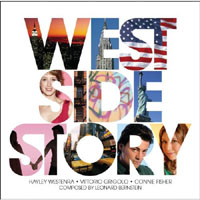 Studio Cast, 2007 (Decca Broadway)
Studio Cast, 2007 (Decca Broadway)  (2 / 5) The shining star of this recording is the Italian operatic tenor Vittorio Grigolo, who gives a gorgeously sung, heartfelt, idiomatically persuasive performance as Tony. In all honestly, Grigolo’s Italian accent is nearly as thick as José Carreras’s Spanish one, but somehow this unsuitability for the character doesn’t rankle nearly as much here — partly because Grigolo sounds captivatingly youthful despite the maturity of his “legit” sound, and he seems much more at home with the score on a stylistic level. Also, he’s smart and sensitive enough to sing softly and lyrically when called for (as in “One Hand, One Heart”) without ever sounding like he’s crooning or condescending to the music. In contrast, the very thin and “white” sound of Hayley Westenra’s voice in the role of Maria is not offset by her vocal acting, which is also pallid in terms of emotion. Especially in her higher register, she sounds so wispy that one can only wonder why she was tapped for this assignment, regardless of whatever name value she may have possessed at the time. Melanie Marshall doesn’t successfully solve the belt-or-head-voice issues presented by Anita’s music, and Connie Fisher sings the achingly beautiful “Somewhere” with too much of a pop-song approach. But Will Martin is one of the best Riffs on record, a couple of obviously Brit pronunciations aside; and the Jets sound convincingly American, including Loren Geeting as Action, who does a fine job with the comedy of “Gee, Officer Krupke.” Nick Ingman conducts the Royal Liverpool Philharmonic with snap in some sections of the score, too slowly in others. But Grigolo’s performance makes this is a must-have recording despite its flaws, and earns it a higher star rating than it would have received otherwise. — M.P.
(2 / 5) The shining star of this recording is the Italian operatic tenor Vittorio Grigolo, who gives a gorgeously sung, heartfelt, idiomatically persuasive performance as Tony. In all honestly, Grigolo’s Italian accent is nearly as thick as José Carreras’s Spanish one, but somehow this unsuitability for the character doesn’t rankle nearly as much here — partly because Grigolo sounds captivatingly youthful despite the maturity of his “legit” sound, and he seems much more at home with the score on a stylistic level. Also, he’s smart and sensitive enough to sing softly and lyrically when called for (as in “One Hand, One Heart”) without ever sounding like he’s crooning or condescending to the music. In contrast, the very thin and “white” sound of Hayley Westenra’s voice in the role of Maria is not offset by her vocal acting, which is also pallid in terms of emotion. Especially in her higher register, she sounds so wispy that one can only wonder why she was tapped for this assignment, regardless of whatever name value she may have possessed at the time. Melanie Marshall doesn’t successfully solve the belt-or-head-voice issues presented by Anita’s music, and Connie Fisher sings the achingly beautiful “Somewhere” with too much of a pop-song approach. But Will Martin is one of the best Riffs on record, a couple of obviously Brit pronunciations aside; and the Jets sound convincingly American, including Loren Geeting as Action, who does a fine job with the comedy of “Gee, Officer Krupke.” Nick Ingman conducts the Royal Liverpool Philharmonic with snap in some sections of the score, too slowly in others. But Grigolo’s performance makes this is a must-have recording despite its flaws, and earns it a higher star rating than it would have received otherwise. — M.P.
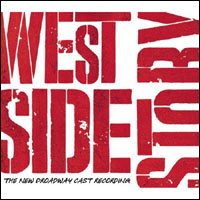 Broadway Cast, 2009 (Masterworks Broadway) No stars; not recommended. Here, for what it’s worth, is an audio memento of a misguided 2009 Broadway revival of West Side Story. While the production itself was primarily sunk by the willfully odd direction of the show’s book writer, Arthur Laurents, the cast album is more specifically undone by the musical direction and conducting of the normally reliable Patrick Vaccariello. His reading of the score begins with a loose performance of the orchestral “Prologue,” and things don’t get much better thereafter; “The Rumble” is conducted stolidly, and Vaccariello drags the tempi for many of the vocal numbers. Among the singers, the female leads come across best: Josefina Scaglione’s sweet yet strong soprano is right for Maria, and Tony Award winner Karen Olivo is alternately sexy, funny, and ferocious as Anita. Matt Cavenaugh sings prettily if somewhat nasally as Tony, but he takes many liberties in terms of musical phrasing, and his delivery of the spoken dialogue included on the recording is extremely stiff. Cavenaugh also stumbles in his far-from-credible New York accent — as does Cody Green, whose intentional mispronunciation of the “r” consonant makes his Riff sound like he requires the services of a speech therapist. When this production opened, much was made of the decision to have Lin-Manuel Miranda (composer/lyricist of Broadway’s In the Heights and, later, Hamilton) translate some of Stephen Sondheim’s lyrics to be sung in Spanish by the Puerto Rican characters, in order to emphasize the clash of cultures that bears significantly on the show’s plot. This might have seemed like a good idea in theory, but in practice, it didn’t work — certainly not in those sections of the “Quintet” version of “Tonight” when the Jets and Sharks, respectively, sing in English and Spanish at the same time. (Most of the Spanish lyrics were eliminated from this production as the run continued, but not before they were recorded on the cast album.) All of these flaws, plus the unwise choices to have a boy soprano sing “Somewhere” and to throw a silly vocal competition into “I Feel Pretty” (sung in Spanish as “Me Siento Hermosa”), make this a highly unsatisfying addition to the West Side Story discography, so much so that it’s not recommended for listening despite its few pluses. — M.P.
Broadway Cast, 2009 (Masterworks Broadway) No stars; not recommended. Here, for what it’s worth, is an audio memento of a misguided 2009 Broadway revival of West Side Story. While the production itself was primarily sunk by the willfully odd direction of the show’s book writer, Arthur Laurents, the cast album is more specifically undone by the musical direction and conducting of the normally reliable Patrick Vaccariello. His reading of the score begins with a loose performance of the orchestral “Prologue,” and things don’t get much better thereafter; “The Rumble” is conducted stolidly, and Vaccariello drags the tempi for many of the vocal numbers. Among the singers, the female leads come across best: Josefina Scaglione’s sweet yet strong soprano is right for Maria, and Tony Award winner Karen Olivo is alternately sexy, funny, and ferocious as Anita. Matt Cavenaugh sings prettily if somewhat nasally as Tony, but he takes many liberties in terms of musical phrasing, and his delivery of the spoken dialogue included on the recording is extremely stiff. Cavenaugh also stumbles in his far-from-credible New York accent — as does Cody Green, whose intentional mispronunciation of the “r” consonant makes his Riff sound like he requires the services of a speech therapist. When this production opened, much was made of the decision to have Lin-Manuel Miranda (composer/lyricist of Broadway’s In the Heights and, later, Hamilton) translate some of Stephen Sondheim’s lyrics to be sung in Spanish by the Puerto Rican characters, in order to emphasize the clash of cultures that bears significantly on the show’s plot. This might have seemed like a good idea in theory, but in practice, it didn’t work — certainly not in those sections of the “Quintet” version of “Tonight” when the Jets and Sharks, respectively, sing in English and Spanish at the same time. (Most of the Spanish lyrics were eliminated from this production as the run continued, but not before they were recorded on the cast album.) All of these flaws, plus the unwise choices to have a boy soprano sing “Somewhere” and to throw a silly vocal competition into “I Feel Pretty” (sung in Spanish as “Me Siento Hermosa”), make this a highly unsatisfying addition to the West Side Story discography, so much so that it’s not recommended for listening despite its few pluses. — M.P.
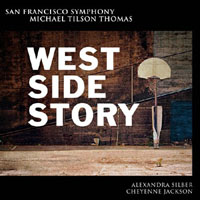 San Francisco Symphony Concert Cast, 2014 (S.F. Symphony, 2CDs)
San Francisco Symphony Concert Cast, 2014 (S.F. Symphony, 2CDs)  (4 / 5) This is an honorable, limited-edition recording of the West Side Story score. Alexandra Silber is generally very fine as Maria, even if she occasionally phrases too freely and distorts some of the written note values. As Tony, Cheyenne Jackson displays an innately beautiful baritenor and excellent musical theater instincts, yet he has a distracting habit of obviously manipulating or “placing” his voice differently for various passages of the score; sometimes he sounds a little throaty, sometimes a bit nasal, sometimes just right. Kevin Vortmann, who has shone in other roles, comes across as rather too “legit” in sound for Riff, and when the Jets and Sharks are singing as a group, they sound more like a large-size concert chorus of trained voices (which they are) than a small band of street toughs. But Jessica Vosk is definitely among the top-tier Anitas, and Julia Bullock sings “Somewhere” gorgeously. The score is presented note-complete and is well conducted overall by Michael Tilson Thomas, even if he sometimes indulges in the penchant of some classical music conductors to set too-slow tempi in WSS. (“I Have a Love” and the opening section of “America” are two examples.) Quite a bit of dialogue is included here, some lines delivered more persuasively than others. The state-of-the-art sound of the recording is spectacular. — M.P.
(4 / 5) This is an honorable, limited-edition recording of the West Side Story score. Alexandra Silber is generally very fine as Maria, even if she occasionally phrases too freely and distorts some of the written note values. As Tony, Cheyenne Jackson displays an innately beautiful baritenor and excellent musical theater instincts, yet he has a distracting habit of obviously manipulating or “placing” his voice differently for various passages of the score; sometimes he sounds a little throaty, sometimes a bit nasal, sometimes just right. Kevin Vortmann, who has shone in other roles, comes across as rather too “legit” in sound for Riff, and when the Jets and Sharks are singing as a group, they sound more like a large-size concert chorus of trained voices (which they are) than a small band of street toughs. But Jessica Vosk is definitely among the top-tier Anitas, and Julia Bullock sings “Somewhere” gorgeously. The score is presented note-complete and is well conducted overall by Michael Tilson Thomas, even if he sometimes indulges in the penchant of some classical music conductors to set too-slow tempi in WSS. (“I Have a Love” and the opening section of “America” are two examples.) Quite a bit of dialogue is included here, some lines delivered more persuasively than others. The state-of-the-art sound of the recording is spectacular. — M.P.
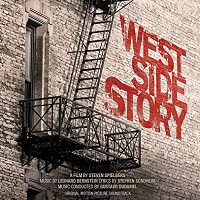 Film Soundtrack, 2021 (Hollywood Records)
Film Soundtrack, 2021 (Hollywood Records)  (4 / 5) Steven Spielberg’s and Tony Kushner’s reimagining of West Side Story for a motion picture remake was largely well received by critics and audience, and the soundtrack album is one of the best-ever recordings of the classic Bernstein/Sondheim score. Gustavo Dudamel expertly and passionately leads the New York Philharmonic (and, for a few passages, the Los Angeles Philharmonic) in a new adaptation of the score that largely preserves the incomparable original arrangements and orchestrations. In the role of Maria, Rachel Zegler displays a lovely voice and is far more natural-sounding that some previously recorded exponents of the role, complete with what strikes this listener’s ears as an accurate Puerto Rican accent. Opposite her as Tony, Ansel Elgort also sings beautifully and persuasively, and both he and Zegler are 100 percent vocally credible as teenagers. Ariana DeBose is strong, sexy, and deeply moving by turns as Anita; David Alvarez impresses in his brief musical moments as Bernardo; and the actors who solo in “Gee, Officer Krupke” (Kevin Csolak, John Michael Fiumara, Jess LeProtto, Ben Cook, Kyle Allen, Myles Erlick, Patrick Higgins) offer vivid vocal characterizations. As Riff, Mike Faist brings to the “Jet Song” a sound as lean and mean as his striking appearance in the film. (Faist is also heard briefly in the “Tonight” ensemble and in “Cool,” but the bulk of the latter has been given to Elgort as Tony in a controversial repurposing of the song; nor is Faist heard at all in “Gee, Officer Krupke,” as his character has been removed from that number, for some reason.) In the new role of Valentina, Doc’s widow, Rita Moreno — who won an Academy Award for her performance as Anita in the first big-screen version of West Side Story — offers a heartbreaking rendition of “Somewhere.” Some WSS acolytes found fault in the overwriting of the new dialogue that Kushner created for the screenplay of the 2021 movie, but since very little of that is heard here, the soundtrack album is enjoyable as an aural document of a worthy cinematic achievement, presented in state-of-the-art recorded sound. — M.P.
(4 / 5) Steven Spielberg’s and Tony Kushner’s reimagining of West Side Story for a motion picture remake was largely well received by critics and audience, and the soundtrack album is one of the best-ever recordings of the classic Bernstein/Sondheim score. Gustavo Dudamel expertly and passionately leads the New York Philharmonic (and, for a few passages, the Los Angeles Philharmonic) in a new adaptation of the score that largely preserves the incomparable original arrangements and orchestrations. In the role of Maria, Rachel Zegler displays a lovely voice and is far more natural-sounding that some previously recorded exponents of the role, complete with what strikes this listener’s ears as an accurate Puerto Rican accent. Opposite her as Tony, Ansel Elgort also sings beautifully and persuasively, and both he and Zegler are 100 percent vocally credible as teenagers. Ariana DeBose is strong, sexy, and deeply moving by turns as Anita; David Alvarez impresses in his brief musical moments as Bernardo; and the actors who solo in “Gee, Officer Krupke” (Kevin Csolak, John Michael Fiumara, Jess LeProtto, Ben Cook, Kyle Allen, Myles Erlick, Patrick Higgins) offer vivid vocal characterizations. As Riff, Mike Faist brings to the “Jet Song” a sound as lean and mean as his striking appearance in the film. (Faist is also heard briefly in the “Tonight” ensemble and in “Cool,” but the bulk of the latter has been given to Elgort as Tony in a controversial repurposing of the song; nor is Faist heard at all in “Gee, Officer Krupke,” as his character has been removed from that number, for some reason.) In the new role of Valentina, Doc’s widow, Rita Moreno — who won an Academy Award for her performance as Anita in the first big-screen version of West Side Story — offers a heartbreaking rendition of “Somewhere.” Some WSS acolytes found fault in the overwriting of the new dialogue that Kushner created for the screenplay of the 2021 movie, but since very little of that is heard here, the soundtrack album is enjoyable as an aural document of a worthy cinematic achievement, presented in state-of-the-art recorded sound. — M.P.
Weird Romance
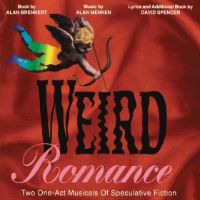 Original Off-Broadway Cast, 1993 (Columbia)
Original Off-Broadway Cast, 1993 (Columbia)  (4 / 5) Composer Alan Menken wrote some of his most dazzling and sophisticated music for this largely forgotten pair of one-act musicals. He and his collaborators — librettist Alan Brennert, lyricist/co-librettist David Spencer, and director Barry Harman –crafted a musical in that most neglected of stage genres, science fiction (also known as “speculative fiction”). The first piece, “The Girl Who Was Plugged In,” is based on a James Tiptree, Jr. story; the second, “Her Pilgrim Soul,” was adapted from an episode of The New Twilight Zone written by Brennert. The cast is superlative: Ellen Greene and Jonathan Hadary, the leads in both pieces, are supported by Danny Burstein, Jessica Molaskey, Valerie Pettiford, Sal Viviano, Eric Riley, William Youmans, and Marguerite Macintyre. If the music isn’t always at the level of Menken’s best — the song “Amazing Penetration” will never be found on a greatest hits album — it’s hard to think of better melodies than the first half’s “Eyes That Never Lie” and the second’s “Another Woman” and “Someone Else Is Waiting.” As for Spencer’s lyrics, they are solid and often clever. The only problem with this cast album is that it’s out of print in CD format, but you can still purchase it as a download. — Seth Christenfeld
(4 / 5) Composer Alan Menken wrote some of his most dazzling and sophisticated music for this largely forgotten pair of one-act musicals. He and his collaborators — librettist Alan Brennert, lyricist/co-librettist David Spencer, and director Barry Harman –crafted a musical in that most neglected of stage genres, science fiction (also known as “speculative fiction”). The first piece, “The Girl Who Was Plugged In,” is based on a James Tiptree, Jr. story; the second, “Her Pilgrim Soul,” was adapted from an episode of The New Twilight Zone written by Brennert. The cast is superlative: Ellen Greene and Jonathan Hadary, the leads in both pieces, are supported by Danny Burstein, Jessica Molaskey, Valerie Pettiford, Sal Viviano, Eric Riley, William Youmans, and Marguerite Macintyre. If the music isn’t always at the level of Menken’s best — the song “Amazing Penetration” will never be found on a greatest hits album — it’s hard to think of better melodies than the first half’s “Eyes That Never Lie” and the second’s “Another Woman” and “Someone Else Is Waiting.” As for Spencer’s lyrics, they are solid and often clever. The only problem with this cast album is that it’s out of print in CD format, but you can still purchase it as a download. — Seth Christenfeld
Watch Your Step
 Off-Off-Broadway Cast, 2001 (Original Cast Records)
Off-Off-Broadway Cast, 2001 (Original Cast Records)  (1 / 5) Irving Berlin’s first hit was exhumed by the Off-Off-Broadway company Musicals Tonight! in 2001. According to the CD notes, the show is a fairly typical 1914 frolic with a thin-to-the-point-of-transparency plot about a will that requires its recipients never to have been in love. After that, you’re on your own; there’s no synopsis to indicate how the songs fit into the story. Furthermore, Berlin interpolated numerous songs into the show during its several months’ run, and all of them are included here. While the recording is unquestionably of archival importance, it comes off as less a show album than a collection of novelty tunes from the early World War I era. Songs like “Come to the Land of the Argentine,” “Show Us How to Do the Fox Trot,” and “Settle Down in a One-Horse Town” could be from virtually any musical of the same general provenance. For that matter, they all sound alike, set as they are to the same ragtime beat. The young cast sings with enthusiasm; the one semi-name, David Sabella, is amusing in numbers such as “Lock Me in Your Harem.” Berlin enthusiasts and those with an interest in the period should add a star or two to the rating above, but the CD has little to offer the general listener. — David Barbour
(1 / 5) Irving Berlin’s first hit was exhumed by the Off-Off-Broadway company Musicals Tonight! in 2001. According to the CD notes, the show is a fairly typical 1914 frolic with a thin-to-the-point-of-transparency plot about a will that requires its recipients never to have been in love. After that, you’re on your own; there’s no synopsis to indicate how the songs fit into the story. Furthermore, Berlin interpolated numerous songs into the show during its several months’ run, and all of them are included here. While the recording is unquestionably of archival importance, it comes off as less a show album than a collection of novelty tunes from the early World War I era. Songs like “Come to the Land of the Argentine,” “Show Us How to Do the Fox Trot,” and “Settle Down in a One-Horse Town” could be from virtually any musical of the same general provenance. For that matter, they all sound alike, set as they are to the same ragtime beat. The young cast sings with enthusiasm; the one semi-name, David Sabella, is amusing in numbers such as “Lock Me in Your Harem.” Berlin enthusiasts and those with an interest in the period should add a star or two to the rating above, but the CD has little to offer the general listener. — David Barbour
Walking Happy
 Original Broadway Cast, 1966 (Capitol/Angel)
Original Broadway Cast, 1966 (Capitol/Angel)  (2 / 5) One of the problems with Walking Happy, which is set in England, is that it seems too American. Still, the show has an entertaining score with some sprightly tunes and heartfelt ballads by the Academy Award-winning team of lyricist Sammy Cahn and composer James Van Heusen. The songs for the two leads — British star Norman Wisdom as Boot Black Will Mossop, and American Louise Troy as Maggie Hobson, the eldest daughter of Will’s employer — are very well integrated with the book. Troy touches the heart with Maggie’s “Where Was I?” and Will ponders “What Makes It Happen?” in his love-seeking ballad. As their relationship turns romantic, Troy’s Maggie does a beautiful “I’ll Make a Man of the Man,” and the pair sings the charming “I Don’t Think I’m in Love.” Throughout, Troy adds a reasonable British accent to her stylish Broadway belt. Wisdom brings a warm voice to the show’s title song and comedic skill to his two duets with fellow bootblack Tubby (Gordon Dilworth), “How D’Ya Talk to a Girl?” (inventively accompanied by the rhythmic sounds of men hammering nails into boot heels) and “It Might as Well Be Her.” The rest of the score is less good. George Rose, as Maggie’s father, participates in three weak songs dealing with the fellow’s sobriety or lack thereof. “Use Your Noggin,” sung by Maggie and her two sisters (Sharon Dierking and Gretchen Van Aken), features a sprightly melody, but the lyrics are so generic that the song could be put into almost any musical. And one of Will’s numbers is the unfortunate “If I Be Your Best Chance,” a prickly “poor me” song. Missing from this recording are two dance numbers that were effective onstage, “Clog and Grog” and the “Box Dance.” However, a good amount of dialogue is included, which makes it easy to follow the plot. — Jeffrey Dunn
(2 / 5) One of the problems with Walking Happy, which is set in England, is that it seems too American. Still, the show has an entertaining score with some sprightly tunes and heartfelt ballads by the Academy Award-winning team of lyricist Sammy Cahn and composer James Van Heusen. The songs for the two leads — British star Norman Wisdom as Boot Black Will Mossop, and American Louise Troy as Maggie Hobson, the eldest daughter of Will’s employer — are very well integrated with the book. Troy touches the heart with Maggie’s “Where Was I?” and Will ponders “What Makes It Happen?” in his love-seeking ballad. As their relationship turns romantic, Troy’s Maggie does a beautiful “I’ll Make a Man of the Man,” and the pair sings the charming “I Don’t Think I’m in Love.” Throughout, Troy adds a reasonable British accent to her stylish Broadway belt. Wisdom brings a warm voice to the show’s title song and comedic skill to his two duets with fellow bootblack Tubby (Gordon Dilworth), “How D’Ya Talk to a Girl?” (inventively accompanied by the rhythmic sounds of men hammering nails into boot heels) and “It Might as Well Be Her.” The rest of the score is less good. George Rose, as Maggie’s father, participates in three weak songs dealing with the fellow’s sobriety or lack thereof. “Use Your Noggin,” sung by Maggie and her two sisters (Sharon Dierking and Gretchen Van Aken), features a sprightly melody, but the lyrics are so generic that the song could be put into almost any musical. And one of Will’s numbers is the unfortunate “If I Be Your Best Chance,” a prickly “poor me” song. Missing from this recording are two dance numbers that were effective onstage, “Clog and Grog” and the “Box Dance.” However, a good amount of dialogue is included, which makes it easy to follow the plot. — Jeffrey Dunn
Violet
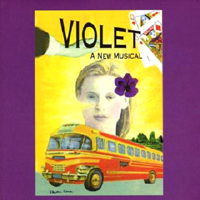 Original Off-Broadway Cast, 1998 (Resmiranda)
Original Off-Broadway Cast, 1998 (Resmiranda)  (3 / 5) Dorris Betts’ short story “The Ugliest Pilgrim” — about a young woman who, maimed by an axe blade as a child, goes on a journey of healing — was the basis for this gem with music by Jeanine Tesori and lyrics by Brian Crawley. Lauren Ward’s Violet is a complex heroine; injured inside and out, she’s full of both bitterness and hope, and her lovely performance translates well onto the recording. It’s when Violet’s biting tongue turns sweet that she sings the highlight of the score, “Lay Down Your Head,” with a melody that makes one’s heart ache. The other songs don’t quite reach that level of simple perfection, but a few that come close are the all-too-brief “Water in the Well,” the thrilling “Let It Sing,” and “On My Way,” a rousing ensemble number that sets Violet and her fellow passengers off on their bus trip. Violet’s trek takes her from North Carolina to Oklahoma, where she goes to meet the televangelist whom she hopes will heal her. On the way, she becomes involved in a love triangle with two soldiers, one white (played by Michael Park), the other black (played by Michael McElroy). Crawley tells their story through colloquial lyrics that feel effortless and natural, and Tesori comes up with a handful of fine countrified tunes. Her gospel songs are less distinguished, but the Broadway Gospel Choir and the powerhouse singer-actor McElroy give this spirited musical some real soul. — Brooke Pierce
(3 / 5) Dorris Betts’ short story “The Ugliest Pilgrim” — about a young woman who, maimed by an axe blade as a child, goes on a journey of healing — was the basis for this gem with music by Jeanine Tesori and lyrics by Brian Crawley. Lauren Ward’s Violet is a complex heroine; injured inside and out, she’s full of both bitterness and hope, and her lovely performance translates well onto the recording. It’s when Violet’s biting tongue turns sweet that she sings the highlight of the score, “Lay Down Your Head,” with a melody that makes one’s heart ache. The other songs don’t quite reach that level of simple perfection, but a few that come close are the all-too-brief “Water in the Well,” the thrilling “Let It Sing,” and “On My Way,” a rousing ensemble number that sets Violet and her fellow passengers off on their bus trip. Violet’s trek takes her from North Carolina to Oklahoma, where she goes to meet the televangelist whom she hopes will heal her. On the way, she becomes involved in a love triangle with two soldiers, one white (played by Michael Park), the other black (played by Michael McElroy). Crawley tells their story through colloquial lyrics that feel effortless and natural, and Tesori comes up with a handful of fine countrified tunes. Her gospel songs are less distinguished, but the Broadway Gospel Choir and the powerhouse singer-actor McElroy give this spirited musical some real soul. — Brooke Pierce
Victor/Victoria
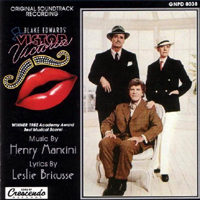 Film Soundtrack, 1982 (MGM/Rhino/GNP Crescendo)
Film Soundtrack, 1982 (MGM/Rhino/GNP Crescendo)  (1 / 5) The Blake Edwards film that served as the basis for Julie Andrews’ last Broadway musical is really a comedy with a few incidental songs. Based on a 1933 German film, it stars Andrews as Victoria, a light opera soprano stranded in 1930s Paris. She’s taken in by Toddy (Robert Preston), a gay nightclub performer who reinvents her as Victor, a Polish female impersonator. Trouble sets in when King Marchan, a Chicago gangster (James Garner), finds himself attracted to “Victor.” The wildly padded soundtrack disc is filled with instrumental interludes from Henry Mancini’s easy-listening score. The film’s few actual songs, with lyrics by Leslie Bricusse, are heard repeatedly in different versions; for example, the silly specialty item “The Shady Dame From Seville.” Andrews and Preston are never less than pros, but this recording is barely worthwhile. — David Barbour
(1 / 5) The Blake Edwards film that served as the basis for Julie Andrews’ last Broadway musical is really a comedy with a few incidental songs. Based on a 1933 German film, it stars Andrews as Victoria, a light opera soprano stranded in 1930s Paris. She’s taken in by Toddy (Robert Preston), a gay nightclub performer who reinvents her as Victor, a Polish female impersonator. Trouble sets in when King Marchan, a Chicago gangster (James Garner), finds himself attracted to “Victor.” The wildly padded soundtrack disc is filled with instrumental interludes from Henry Mancini’s easy-listening score. The film’s few actual songs, with lyrics by Leslie Bricusse, are heard repeatedly in different versions; for example, the silly specialty item “The Shady Dame From Seville.” Andrews and Preston are never less than pros, but this recording is barely worthwhile. — David Barbour
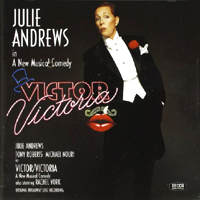 Original Broadway Cast, 1995 (Philips/Decca)
Original Broadway Cast, 1995 (Philips/Decca)  (1 / 5) Julie Andrews’ much-anticipated return to Broadway was upstaged to a certain extent by this show’s many peripheral dramas, including Andrews’ frequent absences, her Tony Awards boycott, and the notorious replacement runs of Liza Minnelli and Raquel Welch. Victor/Victoria was a long-run disappointment, a ham-fisted adaptation of a hit Andrews film put together by a mediocre creative team led by Andrews’ husband, director-librettist Blake Edwards. As in the film, which was also written and directed by Edwards, Andrews’ Victoria is transformed into Victor by Toddy, played here by Tony Roberts (see the review above for more of the plot). Even with her voice darkened by age and afflicted with mannerisms, Andrews is fun to hear on the album; but to get to the pleasant bits, you’ll have to put up with some of the weakest songs ever written for a Broadway show. The main culprits are Henry Mancini and Leslie Bricusse, but additional music was written by Frank Wildhorn after Mancini’s death. “If I Were a Man” sets up the plot in the most laborious fashion. Even worse is “King’s Lament,” in which Victoria’s love interest, King Marchan (Michael Nouri), wrestles with his masculinity. The rock-bottom songs go to Rachel York in the role of King’s chorine girlfriend; they include “Chicago, Illinois” from the movie version (“Smack on the lake, this is a rare port / Someday, they say, we’ll have an airport!”) and the egregious “Paris Makes Me Horny,” which rummages through the names of European cities for the sake of smutty jokes. (Sample: “Been to Munich, where every guy’s a eunuch.”) Andrews makes something out of generic ballads like “Crazy World” (again, from the film) and “Living in the Shadows,” and she has fun with “Le Jazz Hot” (also from the film), but she and Nouri are defeated by the deadly “Almost a Love Song,” which has almost a melody. An unintentional camp highlight is “Louis Says,” one of Victor’s onstage numbers, in which Andrews swans about the stage as Marie Antoinette. Just try to parse the impenetrable stream-of-consciousness lyrics of this song. — D.B.
(1 / 5) Julie Andrews’ much-anticipated return to Broadway was upstaged to a certain extent by this show’s many peripheral dramas, including Andrews’ frequent absences, her Tony Awards boycott, and the notorious replacement runs of Liza Minnelli and Raquel Welch. Victor/Victoria was a long-run disappointment, a ham-fisted adaptation of a hit Andrews film put together by a mediocre creative team led by Andrews’ husband, director-librettist Blake Edwards. As in the film, which was also written and directed by Edwards, Andrews’ Victoria is transformed into Victor by Toddy, played here by Tony Roberts (see the review above for more of the plot). Even with her voice darkened by age and afflicted with mannerisms, Andrews is fun to hear on the album; but to get to the pleasant bits, you’ll have to put up with some of the weakest songs ever written for a Broadway show. The main culprits are Henry Mancini and Leslie Bricusse, but additional music was written by Frank Wildhorn after Mancini’s death. “If I Were a Man” sets up the plot in the most laborious fashion. Even worse is “King’s Lament,” in which Victoria’s love interest, King Marchan (Michael Nouri), wrestles with his masculinity. The rock-bottom songs go to Rachel York in the role of King’s chorine girlfriend; they include “Chicago, Illinois” from the movie version (“Smack on the lake, this is a rare port / Someday, they say, we’ll have an airport!”) and the egregious “Paris Makes Me Horny,” which rummages through the names of European cities for the sake of smutty jokes. (Sample: “Been to Munich, where every guy’s a eunuch.”) Andrews makes something out of generic ballads like “Crazy World” (again, from the film) and “Living in the Shadows,” and she has fun with “Le Jazz Hot” (also from the film), but she and Nouri are defeated by the deadly “Almost a Love Song,” which has almost a melody. An unintentional camp highlight is “Louis Says,” one of Victor’s onstage numbers, in which Andrews swans about the stage as Marie Antoinette. Just try to parse the impenetrable stream-of-consciousness lyrics of this song. — D.B.
Very Good Eddie
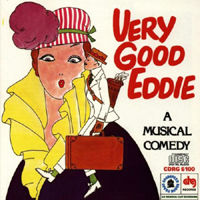 Broadway Cast, 1975 (DRG)
Broadway Cast, 1975 (DRG)  (3 / 5) Very lively, very catchy, very melodic — but not Very Good Eddie. The Goodspeed Opera House’s revival of the 1915 Jerome Kern musical — the first show in the famed Princess Theatre series — was such a hit in Connecticut that David Merrick picked it up and brought it intact to Broadway, where it ran for nearly a year. But, as is Goodspeed’s bad habit, the production fiddled with perfectly fine original material. The result was a kind of hybrid, with several songs missing and others appropriated from various other Kern shows, so much so that nine lyricists are credited! Russell Warner’s lean orchestrations are probably reasonable reductions of Frank Saddler’s originals but, as musical director/conductor, Warner sticks pretty much to one speed: “rollicking.” Yes, the score is full of infectious ragtime, but even ragtime should have more variety than this. Worse, the performance style evinces much winking and borderline camping, especially among the women: Virginia Seidel’s Minnie-Mouse-on-speed chirping just about kills the irresistible “Left All Alone Again Blues,” and Travis Hudson stomps “Moon of Love” into the floorboards. But male leads Charles Repole and David Christmas are more appealing, and the chorus numbers, such as “I’ve Got to Dance” and “Hot Dog,” are so ingratiating that you will, in fact, want to get up and dance. — Marc Miller
(3 / 5) Very lively, very catchy, very melodic — but not Very Good Eddie. The Goodspeed Opera House’s revival of the 1915 Jerome Kern musical — the first show in the famed Princess Theatre series — was such a hit in Connecticut that David Merrick picked it up and brought it intact to Broadway, where it ran for nearly a year. But, as is Goodspeed’s bad habit, the production fiddled with perfectly fine original material. The result was a kind of hybrid, with several songs missing and others appropriated from various other Kern shows, so much so that nine lyricists are credited! Russell Warner’s lean orchestrations are probably reasonable reductions of Frank Saddler’s originals but, as musical director/conductor, Warner sticks pretty much to one speed: “rollicking.” Yes, the score is full of infectious ragtime, but even ragtime should have more variety than this. Worse, the performance style evinces much winking and borderline camping, especially among the women: Virginia Seidel’s Minnie-Mouse-on-speed chirping just about kills the irresistible “Left All Alone Again Blues,” and Travis Hudson stomps “Moon of Love” into the floorboards. But male leads Charles Repole and David Christmas are more appealing, and the chorus numbers, such as “I’ve Got to Dance” and “Hot Dog,” are so ingratiating that you will, in fact, want to get up and dance. — Marc Miller
The Utter Glory of Morrissey Hall
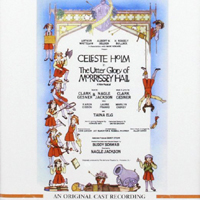 Original Broadway Cast, 1979 (Original Cast Records)
Original Broadway Cast, 1979 (Original Cast Records)  (2 / 5) This was a good idea: a sort of unofficial musical version of the old “St. Trinian’s” stories and movies about an English school filled with horrid little girls. The first 10 minutes of the show are fun, as authors Clark Gesner and Nagle Jackson (who also directed) set up various characters and story lines — and then simply abandon them. The rest of The Utter Glory of Morrissey Hall is plotless, filled with incidents that don’t tie together. For example, one group of girls believe they’re about to be sold into white slavery; a young boy in love mails himself to his girlfriend in a trunk; and there’s a grown-up romance between a secretary and a salesman who must hide their passion. Presiding over all of this is the dotty headmistress, played amusingly by Celeste Holm. As events spin out of her control, the woman simply withdraws, locking herself in her office and happily pressing flowers. Gesner, the composer-lyricist of You’re a Good Man, Charlie Brown, provides a score that’s lightly mocking in a stiff-upper-lip sort of way, but with nothing substantial to hang these songs on, they don’t add up to much. — David Wolf
(2 / 5) This was a good idea: a sort of unofficial musical version of the old “St. Trinian’s” stories and movies about an English school filled with horrid little girls. The first 10 minutes of the show are fun, as authors Clark Gesner and Nagle Jackson (who also directed) set up various characters and story lines — and then simply abandon them. The rest of The Utter Glory of Morrissey Hall is plotless, filled with incidents that don’t tie together. For example, one group of girls believe they’re about to be sold into white slavery; a young boy in love mails himself to his girlfriend in a trunk; and there’s a grown-up romance between a secretary and a salesman who must hide their passion. Presiding over all of this is the dotty headmistress, played amusingly by Celeste Holm. As events spin out of her control, the woman simply withdraws, locking herself in her office and happily pressing flowers. Gesner, the composer-lyricist of You’re a Good Man, Charlie Brown, provides a score that’s lightly mocking in a stiff-upper-lip sort of way, but with nothing substantial to hang these songs on, they don’t add up to much. — David Wolf
Urinetown
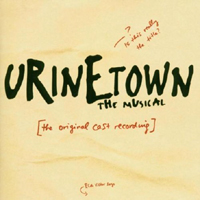 Original Broadway Cast, 2001 (RCA)
Original Broadway Cast, 2001 (RCA)  (4 / 5) This show, which winks at Bertolt Brecht-Kurt Weill works and like-minded tuners, poses the musical question: Is it possible for a score to be too clever? The answer is probably yes. To complement a book about a Mahagonny-type burg where the citizens are oppressed by a corporation that controls all restrooms, composer-lyricist Mark Hollmann and lyricist-librettist Greg Kotis wrote a tuneful score that cannily mocks even as it pays homage. While hooting at musical cliches in song and dialogue, the creators walk a thin line with the agility of world-class aerialists. Spilling from this words-and-notes cornucopia are send-ups of such musical conventions as title tunes, double-edged ballads (“Follow Your Heart”), comedy turns (“Don’t Be the Bunny”), and heart-lifters (“Run, Freedom, Run!”). The cast is led by staunch Hunter Foster, full-of-his-bad-self John Cullum, cute-as-a-frayed-button Spencer Kayden, sincere Jennifer Laura Thompson, and Jeff McCarthy, who places his tongue very firmly in his cheek in the role of Officer Lockstock. All have the required fervor. The problem is an embarrassment of riches that begins to tire the listener as the songs, delivered by a dynamic ensemble, start to sound alike. Of course, those who experience Urinetown only via the recording can’t see the wonders worked by John Rando and John Carrafa, who followed the tunesmiths’ ribbing of various styles of musical theater writing by doing the same with their direction and choreography, respectively. Still, the score is far above average for contemporary musicals and very well played by a sassy five-person band, with Edward Goldschneider at the piano. — David Finkle
(4 / 5) This show, which winks at Bertolt Brecht-Kurt Weill works and like-minded tuners, poses the musical question: Is it possible for a score to be too clever? The answer is probably yes. To complement a book about a Mahagonny-type burg where the citizens are oppressed by a corporation that controls all restrooms, composer-lyricist Mark Hollmann and lyricist-librettist Greg Kotis wrote a tuneful score that cannily mocks even as it pays homage. While hooting at musical cliches in song and dialogue, the creators walk a thin line with the agility of world-class aerialists. Spilling from this words-and-notes cornucopia are send-ups of such musical conventions as title tunes, double-edged ballads (“Follow Your Heart”), comedy turns (“Don’t Be the Bunny”), and heart-lifters (“Run, Freedom, Run!”). The cast is led by staunch Hunter Foster, full-of-his-bad-self John Cullum, cute-as-a-frayed-button Spencer Kayden, sincere Jennifer Laura Thompson, and Jeff McCarthy, who places his tongue very firmly in his cheek in the role of Officer Lockstock. All have the required fervor. The problem is an embarrassment of riches that begins to tire the listener as the songs, delivered by a dynamic ensemble, start to sound alike. Of course, those who experience Urinetown only via the recording can’t see the wonders worked by John Rando and John Carrafa, who followed the tunesmiths’ ribbing of various styles of musical theater writing by doing the same with their direction and choreography, respectively. Still, the score is far above average for contemporary musicals and very well played by a sassy five-person band, with Edward Goldschneider at the piano. — David Finkle
The Unsinkable Molly Brown
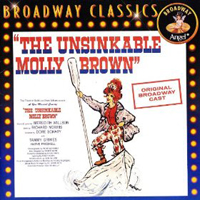 Original Broadway Cast, 1960 (Capitol/Angel)
Original Broadway Cast, 1960 (Capitol/Angel)  (4 / 5) “I ain’t down yet!” shouts/sings the title character of this rowdy musical based on the real-life story of Molly Brown, and that might also be the motto of the show itself. Composer-lyricist Meredith Willson wrote this score right after his spectacular success with The Music Man. In a sense, The Unsinkable Molly Brown is the feisty younger sister of that great American musical; it’s rough around the edges, but just as appealing in its own way. One reason for its initial success was the casting of the young Tammy Grimes and Harve Presnell, who were instantly recognized for their star quality in the show’s leading roles. Grimes’ inimitable voice is perfect for Molly, and her performance on the album is full of energy, especially in the rousing “I Ain’t Down Yet” and “Belly Up to the Bar, Boys.” Presnell’s gorgeous baritone is a joy; when he belts out “I’ll Never Say No,” goose bumps rise. The album is so well recorded that it makes you feel as if you’re seated front-row-center for this joyous musical. Oddly, although Johnny Brown’s “Colorado, My Home” is in the show’s printed score and the melody is heard briefly in the overture, the song is not sung by Presnell on the album. But the recording is otherwise quite full, and since so many numbers were cut from the film version of Molly Brown and its soundtrack album (see below), this is your best opportunity to hear the bulk of the original score, including “I’ve A’ready Started In,” “My Own Brass Bed,” “Bea-u-ti-ful People of Denver,” “Are You Sure,” “If I Knew,” “Chick-a-Pen,” and “Dolce Far Niente.” — Gerard Alessandrini
(4 / 5) “I ain’t down yet!” shouts/sings the title character of this rowdy musical based on the real-life story of Molly Brown, and that might also be the motto of the show itself. Composer-lyricist Meredith Willson wrote this score right after his spectacular success with The Music Man. In a sense, The Unsinkable Molly Brown is the feisty younger sister of that great American musical; it’s rough around the edges, but just as appealing in its own way. One reason for its initial success was the casting of the young Tammy Grimes and Harve Presnell, who were instantly recognized for their star quality in the show’s leading roles. Grimes’ inimitable voice is perfect for Molly, and her performance on the album is full of energy, especially in the rousing “I Ain’t Down Yet” and “Belly Up to the Bar, Boys.” Presnell’s gorgeous baritone is a joy; when he belts out “I’ll Never Say No,” goose bumps rise. The album is so well recorded that it makes you feel as if you’re seated front-row-center for this joyous musical. Oddly, although Johnny Brown’s “Colorado, My Home” is in the show’s printed score and the melody is heard briefly in the overture, the song is not sung by Presnell on the album. But the recording is otherwise quite full, and since so many numbers were cut from the film version of Molly Brown and its soundtrack album (see below), this is your best opportunity to hear the bulk of the original score, including “I’ve A’ready Started In,” “My Own Brass Bed,” “Bea-u-ti-ful People of Denver,” “Are You Sure,” “If I Knew,” “Chick-a-Pen,” and “Dolce Far Niente.” — Gerard Alessandrini
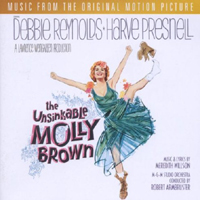 Film Soundtrack, 1964 (MGM/Rhino-Turner)
Film Soundtrack, 1964 (MGM/Rhino-Turner)  (4 / 5) Debbie Reynolds wrapped this musical around her little finger when she made the movie version. While the film is uneven, Reynolds propels it into the realm of a great MGM musical by shouting, grunting, and absolutely refusing to give less than 100 percent of herself to the role of Molly. Happily, Harve Presnell recreates his stunning Broadway performance as Johnny Brown; here, he sounds less big-baritonal and more tenorish than he does on the Broadway recording, but the effect is appropriate for the greater intimacy of the film medium. One of Presnell’s best numbers is the majestic “Colorado, My Home,” absent from the Broadway album. “I Ain’t Down Yet’ and “Belly Up to the Bar Boys” are the high points for Reynolds. Robert Armbruster’s musical direction is excellent, and the thrilling orchestrations are just about up to par with the great MGM musical sound of earlier decades. The only unfortunate aspect of the film and the soundtrack album is that so many of the Broadway songs were excised; missed most of all are “Beautiful People of Denver” and “Are You Sure?” Willson did write one new song for the film: “He’s My Friend,” a free-for-all dance number that helps keep the second half of the movie buoyant, at least until that scene where the Titanic sinks. Rhino’s expanded soundtrack CD is a delight. — G.A.
(4 / 5) Debbie Reynolds wrapped this musical around her little finger when she made the movie version. While the film is uneven, Reynolds propels it into the realm of a great MGM musical by shouting, grunting, and absolutely refusing to give less than 100 percent of herself to the role of Molly. Happily, Harve Presnell recreates his stunning Broadway performance as Johnny Brown; here, he sounds less big-baritonal and more tenorish than he does on the Broadway recording, but the effect is appropriate for the greater intimacy of the film medium. One of Presnell’s best numbers is the majestic “Colorado, My Home,” absent from the Broadway album. “I Ain’t Down Yet’ and “Belly Up to the Bar Boys” are the high points for Reynolds. Robert Armbruster’s musical direction is excellent, and the thrilling orchestrations are just about up to par with the great MGM musical sound of earlier decades. The only unfortunate aspect of the film and the soundtrack album is that so many of the Broadway songs were excised; missed most of all are “Beautiful People of Denver” and “Are You Sure?” Willson did write one new song for the film: “He’s My Friend,” a free-for-all dance number that helps keep the second half of the movie buoyant, at least until that scene where the Titanic sinks. Rhino’s expanded soundtrack CD is a delight. — G.A.
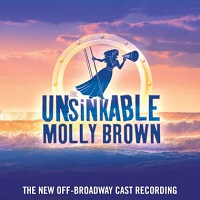 Off-Broadway Cast, 2020 (Broadway Records/Yellow Sound Lab)
Off-Broadway Cast, 2020 (Broadway Records/Yellow Sound Lab)  (3 / 5) A top-to-bottom revamp of this not-quite-classic musical, the Transport Group’s revisal of a show they still insisted on calling The Unsinkable Molly Brown was embraced by some but deplored by others. Courtesy of Dick Scanlan, this production featured an unfocused new book with too many added, extraneous characters, plus a different song stack — a few Meredith Willson songs not found in the original score were thrown in, and there are also some omissions. The cast album eschews an overture and begins with “I Ain’t Down Yet,” which is probably just as well, considering the smallish orchestra heard here; and while David Aron Damane as JJ (f.k.a. Johnny Brown) brings a rich, warm baritone to “I’ll Never Say No” and other songs, we don’t get to hear him sing “Colorado My Home,” as that number is included only as a “bonus track” sung by the ensemble. (Michael Rafter is credited, or debited, with the “adaptation of Meredith Willson’s music,” and Joey Chancey is the music director.) To put it mildly, fans of The Unsinkable Molly Brown in its original form are likely to be nonplussed by all the cuts, additions, and rewrites made for this new creation. Still, the cast album is enjoyable on its own terms, highlighted by Beth Malone’s delightfully spunky performance in the title role, plus some lusty singing from the rest of the company. And for all of the objections that might be filed concerning the major changes made for this revisal, it is nice to have “He’s My Friend,” which Willson wrote specifically for the film version of Molly Brown, finally included in the show score. [Note: This production’s run was abbreviated by the COVID pandemic, and the cast recording sessions were delayed, which accounts for the fact that the album wasn’t released until the summer of 2022.] — Michael Portantiere
(3 / 5) A top-to-bottom revamp of this not-quite-classic musical, the Transport Group’s revisal of a show they still insisted on calling The Unsinkable Molly Brown was embraced by some but deplored by others. Courtesy of Dick Scanlan, this production featured an unfocused new book with too many added, extraneous characters, plus a different song stack — a few Meredith Willson songs not found in the original score were thrown in, and there are also some omissions. The cast album eschews an overture and begins with “I Ain’t Down Yet,” which is probably just as well, considering the smallish orchestra heard here; and while David Aron Damane as JJ (f.k.a. Johnny Brown) brings a rich, warm baritone to “I’ll Never Say No” and other songs, we don’t get to hear him sing “Colorado My Home,” as that number is included only as a “bonus track” sung by the ensemble. (Michael Rafter is credited, or debited, with the “adaptation of Meredith Willson’s music,” and Joey Chancey is the music director.) To put it mildly, fans of The Unsinkable Molly Brown in its original form are likely to be nonplussed by all the cuts, additions, and rewrites made for this new creation. Still, the cast album is enjoyable on its own terms, highlighted by Beth Malone’s delightfully spunky performance in the title role, plus some lusty singing from the rest of the company. And for all of the objections that might be filed concerning the major changes made for this revisal, it is nice to have “He’s My Friend,” which Willson wrote specifically for the film version of Molly Brown, finally included in the show score. [Note: This production’s run was abbreviated by the COVID pandemic, and the cast recording sessions were delayed, which accounts for the fact that the album wasn’t released until the summer of 2022.] — Michael Portantiere
Two’s Company
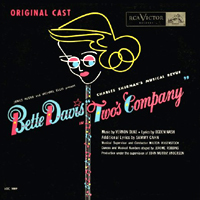 Original Broadway Cast, 1952 (RCA/Masterworks Broadway)
Original Broadway Cast, 1952 (RCA/Masterworks Broadway)  (3 / 5) Bette Davis always claimed that she knew exactly what she was doing when she decided to star in this revue. “Just turn me loose on Broadway as a musical comedy girl,” she sings (?) here. Two’s Company certainly had some prime talent behind it: composer Vernon Duke, lyricists Ogden Nash and Sammy Cahn, choreographer Jerome Robbins, and a strong cast that included David Burns, Ellen Hanley, and Nora Kaye. But the critics were bewildered, and the star’s illness forced the show to close after three sold-out months on Broadway. Without this particular star, Two’s Company would have been just another late-entry collection of topical skits and so-so songs; with her, it has retained a status perched somewhere between legendary disaster and unparalleled curiosity. The cast album certainly makes for interesting listening. The material is adequate, the supporting cast and presentation are strong, and the opening “Theatre Is a Lady” is a worthy anthem. Onstage, Davis’s authority may have masked some of her musical deficiencies, but on the recording, she sounds like a drag impersonator in a piano bar just before last call. Her pitch is uniquely her own, and her phrasing is a harbinger of her odd line readings in her later films. In a hillbilly number, “Purple Rose,” she’s game but uneasy and not very funny, yet she’s touching in the torchy “Just Like a Man.” Since her only subsequent musical was the ill-fated, unrecorded Miss Moffatt, the Two’s Company album is a fascinating footnote to a long, magnificently uneven career. — Richard Barrios
(3 / 5) Bette Davis always claimed that she knew exactly what she was doing when she decided to star in this revue. “Just turn me loose on Broadway as a musical comedy girl,” she sings (?) here. Two’s Company certainly had some prime talent behind it: composer Vernon Duke, lyricists Ogden Nash and Sammy Cahn, choreographer Jerome Robbins, and a strong cast that included David Burns, Ellen Hanley, and Nora Kaye. But the critics were bewildered, and the star’s illness forced the show to close after three sold-out months on Broadway. Without this particular star, Two’s Company would have been just another late-entry collection of topical skits and so-so songs; with her, it has retained a status perched somewhere between legendary disaster and unparalleled curiosity. The cast album certainly makes for interesting listening. The material is adequate, the supporting cast and presentation are strong, and the opening “Theatre Is a Lady” is a worthy anthem. Onstage, Davis’s authority may have masked some of her musical deficiencies, but on the recording, she sounds like a drag impersonator in a piano bar just before last call. Her pitch is uniquely her own, and her phrasing is a harbinger of her odd line readings in her later films. In a hillbilly number, “Purple Rose,” she’s game but uneasy and not very funny, yet she’s touching in the torchy “Just Like a Man.” Since her only subsequent musical was the ill-fated, unrecorded Miss Moffatt, the Two’s Company album is a fascinating footnote to a long, magnificently uneven career. — Richard Barrios
Two on the Aisle
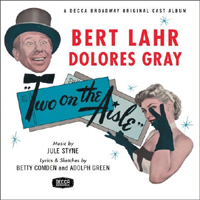 Original Broadway Cast, 1951 (Decca/MCA)
Original Broadway Cast, 1951 (Decca/MCA)  (5 / 5) How does a recording of a second-rank show become an irreplaceable treasure? Here’s how: By 1951, the big-star Broadway revue was beginning to gather up its stars and skits for a finale, largely due to competition from television variety shows. Nevertheless, Betty Comden and Adolph Green still had a few satirical tricks up their sleeves. In collaboration with composer Jule Styne, they came up with a smart throwback to the days of headliner-packed revues, and that’s where Two on the Aisle shone most brightly, in that it starred Broadway’s premier clown and one of the greatest singers ever to set foot on a stage. Nor were their tasks circumscribed, for Bert Lahr could sing (in a unique fashion) and Dolores Gray was an ace comedienne. There were also supporting actors, none of them too impressive, and a rather gruesome pair of singing lovers. Fortunately, the cast album focuses on Lahr and Gray in both musical and comedic modes, without conveying their well-documented backstage feud. All here is golden, or close to it: Lahr’s mock-Pagliacci ode to “The Clown”; the chorus’s “Show Train,” an amusing précis of then-current stage hits; and Lahr and Gray as a vaudeville team invading the Metropolitan Opera (“You’ll be Lucia,” he blusters, “and I’ll be Sextet”). Gray is sensational, her songs perfectly tailored to her fabulous singing — intimate yet volcanic, funny, sexy, and so technically accomplished (with that precise diction) that lieder recitalists should study it. Gray’s performance of “If (You Hadn’t but You Did)” alone earns her a place in the Broadway pantheon. — Richard Barrios
(5 / 5) How does a recording of a second-rank show become an irreplaceable treasure? Here’s how: By 1951, the big-star Broadway revue was beginning to gather up its stars and skits for a finale, largely due to competition from television variety shows. Nevertheless, Betty Comden and Adolph Green still had a few satirical tricks up their sleeves. In collaboration with composer Jule Styne, they came up with a smart throwback to the days of headliner-packed revues, and that’s where Two on the Aisle shone most brightly, in that it starred Broadway’s premier clown and one of the greatest singers ever to set foot on a stage. Nor were their tasks circumscribed, for Bert Lahr could sing (in a unique fashion) and Dolores Gray was an ace comedienne. There were also supporting actors, none of them too impressive, and a rather gruesome pair of singing lovers. Fortunately, the cast album focuses on Lahr and Gray in both musical and comedic modes, without conveying their well-documented backstage feud. All here is golden, or close to it: Lahr’s mock-Pagliacci ode to “The Clown”; the chorus’s “Show Train,” an amusing précis of then-current stage hits; and Lahr and Gray as a vaudeville team invading the Metropolitan Opera (“You’ll be Lucia,” he blusters, “and I’ll be Sextet”). Gray is sensational, her songs perfectly tailored to her fabulous singing — intimate yet volcanic, funny, sexy, and so technically accomplished (with that precise diction) that lieder recitalists should study it. Gray’s performance of “If (You Hadn’t but You Did)” alone earns her a place in the Broadway pantheon. — Richard Barrios
Two Gentlemen of Verona
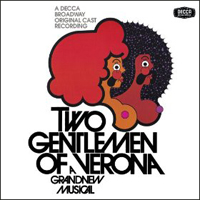 Original Broadway Cast, 1971 (Decca)
Original Broadway Cast, 1971 (Decca)  (3 / 5) When you listen to the original cast recording of Two Gentlemen of Verona, you’ll know why this show won the 1972 Tony Award for Best Musical but not for Best Score. Even though the score, by composer Galt MacDermot and lyricist John Guare, is hopelessly locked into the 1970s, the album is an enjoyable listen; it captures a show of tremendous youth, vivacity, and edge, a unique mixture of Shakespeare and rock. The result is a century-spanning musical party. Sure, there are some duds, such as “Thurio’s Samba,” in which swear words and vulgarities are rhymed with nonsense syllables. But the standouts — “Summer, Summer,” “I Love My Father,” “Night Letter,” “Hot Lover,” and the finale — are quite a bit of fun. A fine cast helps: the one-and-only Raul Julia, Clifton Davis, Diana Davila, and Jonelle Allen, all of whom sound as if they’ve having the time of their lives. — Matthew Murray
(3 / 5) When you listen to the original cast recording of Two Gentlemen of Verona, you’ll know why this show won the 1972 Tony Award for Best Musical but not for Best Score. Even though the score, by composer Galt MacDermot and lyricist John Guare, is hopelessly locked into the 1970s, the album is an enjoyable listen; it captures a show of tremendous youth, vivacity, and edge, a unique mixture of Shakespeare and rock. The result is a century-spanning musical party. Sure, there are some duds, such as “Thurio’s Samba,” in which swear words and vulgarities are rhymed with nonsense syllables. But the standouts — “Summer, Summer,” “I Love My Father,” “Night Letter,” “Hot Lover,” and the finale — are quite a bit of fun. A fine cast helps: the one-and-only Raul Julia, Clifton Davis, Diana Davila, and Jonelle Allen, all of whom sound as if they’ve having the time of their lives. — Matthew Murray
Two by Two
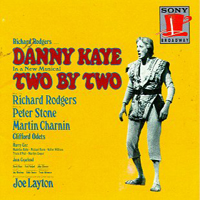 Original Broadway Cast, 1970 (Columbia/Sony)
Original Broadway Cast, 1970 (Columbia/Sony)  (3 / 5) With music by Richard Rodgers, lyrics by Martin Charnin, and a book by Peter Stone, Two by Two is an adaptation of Clifford Odets’ play The Flowering Peach. The show became notorious for the onstage antics of its star, Danny Kaye, who turned the whole thing into an unruly vaudeville act when he resorted to performing the role of Noah in a wheelchair after tearing a ligament. None of his bad behavior need be suffered on the cast album, although showpieces like “Ninety Again!” and “You Have Got to Have a Rudder on the Ark” do reveal a self-indulgent star. Get past that and you’ll hear mostly excellent, late-career Rodgers; the master infuses ballads like “I Do Not Know a Day I Did Not Love You” and “Something Doesn’t Happen” with his trademark warmth and melodic surprises. Eddie Sauter’s orchestrations have a comfy feel, and Charnin’s lyrics are probably the best of his career, pitched midway between the sentiment of Hammerstein and the dexterity of Hart. The supporting cast is as youthful and exuberant as Kaye is old-school and steeped in shtick: Walter Willison sings out with real Broadway juvenile brio, and Madeline Kahn nails a high C at the end of a vulgar piece of special material. The CD has a brief Act I finale track that’s missing from the LP, and it’s a much better sonic mix. — Marc Miller
(3 / 5) With music by Richard Rodgers, lyrics by Martin Charnin, and a book by Peter Stone, Two by Two is an adaptation of Clifford Odets’ play The Flowering Peach. The show became notorious for the onstage antics of its star, Danny Kaye, who turned the whole thing into an unruly vaudeville act when he resorted to performing the role of Noah in a wheelchair after tearing a ligament. None of his bad behavior need be suffered on the cast album, although showpieces like “Ninety Again!” and “You Have Got to Have a Rudder on the Ark” do reveal a self-indulgent star. Get past that and you’ll hear mostly excellent, late-career Rodgers; the master infuses ballads like “I Do Not Know a Day I Did Not Love You” and “Something Doesn’t Happen” with his trademark warmth and melodic surprises. Eddie Sauter’s orchestrations have a comfy feel, and Charnin’s lyrics are probably the best of his career, pitched midway between the sentiment of Hammerstein and the dexterity of Hart. The supporting cast is as youthful and exuberant as Kaye is old-school and steeped in shtick: Walter Willison sings out with real Broadway juvenile brio, and Madeline Kahn nails a high C at the end of a vulgar piece of special material. The CD has a brief Act I finale track that’s missing from the LP, and it’s a much better sonic mix. — Marc Miller
Tuscaloosa’s Calling Me…But I’m Not Going!
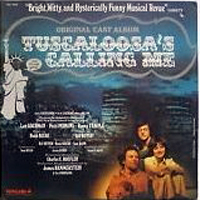 Original Off-Broadway Cast, 1975 (Vanguard/no CD) No stars; not recommended. The dated humor of this revue makes the cast album more of a time capsule than a listening pleasure. Written as a love letter to New York, the score, by composer Hank Beebe and lyricist Bill Heyer, takes lightly satirical swipes at Big Apple attitude (“Everything You Hate Is Right Here,” sung by “Sodom and the Gomorrahs”), nudity in the theater (“Things Were Out”), sex (“Fugue for a Ménage aTrois”), and the dating scene (“Singles Bar”). The archeologically minded will appreciate the two sketches included on the recording, especially the dialogue between a cab driver and an out-of-towner who complains about Broadway theater tickets costing 17 dollars. It’s all very lacking in distinction, although the title tune is rather stirring. Of the three-person cast, only Patti Perkins stands out with her childlike belt. Seventies nostalgists may change the rating above to one star. — David Barbour
Original Off-Broadway Cast, 1975 (Vanguard/no CD) No stars; not recommended. The dated humor of this revue makes the cast album more of a time capsule than a listening pleasure. Written as a love letter to New York, the score, by composer Hank Beebe and lyricist Bill Heyer, takes lightly satirical swipes at Big Apple attitude (“Everything You Hate Is Right Here,” sung by “Sodom and the Gomorrahs”), nudity in the theater (“Things Were Out”), sex (“Fugue for a Ménage aTrois”), and the dating scene (“Singles Bar”). The archeologically minded will appreciate the two sketches included on the recording, especially the dialogue between a cab driver and an out-of-towner who complains about Broadway theater tickets costing 17 dollars. It’s all very lacking in distinction, although the title tune is rather stirring. Of the three-person cast, only Patti Perkins stands out with her childlike belt. Seventies nostalgists may change the rating above to one star. — David Barbour

